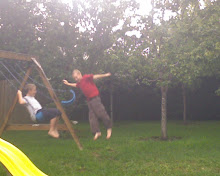Health is worth more than learning.
Thomas Jefferson, letter to his cousin John Garland Jefferson, June 11, 1790
Last Sunday was the 15th Anniversary of the day Brian and I, and a lot of our other friends from that era, graduated high school. Yes, I celebrate the day. I celebrate every May 20th as the day I was finally free. The next day, May 21st, 1992, I went to a party at a friends house. I'll never forget that beautiful day. I was sprinkling outside, and cloudy, which is a beautiful treat in the desert. We all felt a new experience when we were resting and playing billiards when the school bus went by that afternoon, and for the first time in our memorable lives, we weren't breaking the law by not being on those buses. It was an amazing feeling, and I am still so grateful for it.
So, what happened last Sunday?... Last Sunday, Brian and I realized that my stress is too high, above my cortisol level (the level at which a body runs out of cortisol and switches to using adrenaline as an energy source), since my cortisol level is too low naturally. So, I’m used to running on adrenaline (epinephrine), which runs out quickly, makes you move too fast, makes you need caffeine, makes you upset because you’re always moving and staying awake with borrowed energy.
And, to be fair, Brian already knew, it's just that he finally convinced me. We both know that the one time I was the healthiest (meaning skinniest and ovulated) was a time in which I rested a lot: I read lots of books, rested more, took two naps a day, and was very happy while taking care of my oldest baby. Whatever it is that is backwards with me, it applies to this. We also know that I always gain weight when I take up a running or walking program, and we know, and my doctor confirms, that my diet makes no difference until we get this chemical imbalance under control.
With the addition of prescription cortisol, 20 mg Cortef, broken down to 3 or 4 doses a day, it is now, for the first time in my life, possible to keep myself in a place where I am running on cortisol and not running out of cortisol. It’s the opposite of diabetes. The trick now, then, is not only to take enough cortisol to sustain its purposes in life, such as keeping blood sugar up, providing energy to stay awake, providing the ability to handle stress in life, and stop the production of androgen-producing hormones. Too much cortisol is also not good, which is the condition that is experienced by most people with cortisol disorders (who are opposite of me). The first symptom with me is water gain, next the appetite gets a little above normal. When those start to happen, I lower the dose to 15 mg a day for a few days. Then, it will be noticed that energy levels and ability to handle normal stress decrease rapidly, at which point go back up to 20 mg a day.
Just taking supplemental cortisol is not enough for me: a mother of boys with high expectations on myself, who has lived on (and am used to living on) adrenaline and very low cortisol all of my life. So, the other change, in addition to taking cortisol, and making sure the diet stays appropriate, is to lower stress in my life. The more stressed I am, the more cortisol I will need, then I will switch to using adrenaline (not comfortable), and will no longer block ACTH (androgen) hormones.
The trick, then, is to keep my stress levels low – below the level at which the body switches from using cortisol to adrenaline as the energy source – and to have it remain in that state as much of the time as possible.
The more of the time I am running on cortisol, and not adrenaline, I’m not only calmer, happier, and a lot more fun to be with, but the more of the time that the androgenic hormones are being blocked from disproportionately taking over my body. It’s a tricky balance to find, cortisol levels change hour by hour in people who produce adequate amounts. So, I have to learn to balance stress, to relax, and to take my cortisol at the correct times during the day.
Medicines I am taking now: Cortef (cortisol) 20mg a day by prescription; billions of probiotics (in a capsule OTC), three times a day (to generate normal hunger, to allow normal digestion, and to minimize autistic features -- like cortisol, I also do not naturally produce anywhere near enough of these); 5-htp spray, 50 mg, twice a day (to convert excess dopamine to serotonin; progesterone cream, by prescription, twice a day from days 12 to 32 in my cycle. I also walk occasionally and do yoga stretching every night before bed. I also take Traditional Medicinal herbal teas as additional medicine as needed.
This staying-unstressed thing will be a big change in my life. I'm usually what would probably be considered an over-worker, and I think I was taking my own health in exchange. And, per Thomas Jefferson's quote above, as much as I love doing and building and learning, I need to put my health first by relaxing enough to allow my hormones to work correctly.
I know much of this doesn't apply to pretty much anyone else out there. I write these things because they are such important realizations to me that I don't want to forget them. So, note to self: remember that not only do I need to take cortisol to have enough cortisol, but I have to be sure to live in that cortisol-using place. Only then can I achieve my goals of having the best body for me. :-)
On this website, which explains CAH, there is a very good explanation that I thought I'd share with you here...
"Cortisol is a steroid produced by the adrenal glands that is needed for our bodies to deal with physical and emotional stress, and to maintain adequate energy supply and blood sugar levels. The adrenal glands are actually controlled by the pituitary gland. The pituitary gland is a small pea-shaped gland at the base of the brain. When the pituitary gland senses that there is not enough cortisol present in the bloodstream, it releases a hormone called ACTH (adrenocoricotrophic hormone). ACTH stimulates the adrenals to produce more cortisol. However, those with CAH have insufficient amounts of the enzyme 21-OHP needed to convert a precursor molecule called 17-hydroxyprogesterone (17-OHP) into cortisol. As a result, the pituitary gland continues to sense the need for cortisol and pumps out more ACTH. This leads to an overabundance of 17-OHP, which is converted in the adrenals into excess androgens, masculinizing steroid hormones (see Figures 3 and 4). Lack of adequate cortisol also prevents the body from properly metabolizing sugar and responding to stress. The lack of this stress response can lead to drowsiness and possibly coma."
Also, here are some quotes from a website on Cortisol. The condition he's describing isn't the same as what I have, but parts of it explain me. So, I've taken out those parts and added them here to further explain what I'm referring to....
"In instances of major fatigue and anxiety the patients have reached a state of adrenal exhaustion which results in low cortisol. When this occurs there is no choice but to use our backup emergency hormone, adrenalin, for all the things are regulated by cortisol: energy, allergy and stress. Whenever your body calls on your adrenal gland and says, "we need some energy, send us some cortisol," your adrenal gland replies, "sorry girl, you’ve been out of cortisol...; but we'll send you what we've got plenty of... adrenalin."
"Adrenalin is designed for life-threatening EMERGENCIES. In previous ages it was only needed when you were attacked by raging wolves or tigers. It allows us to perform superhuman tasks required for survival. It's like rocket fuel.
"Furthermore, you use adrenalin for all the things for which you usually use cortisol. Adrenalin will get it done, but it is a very uncomfortable form of energy. Hard, brittle energy. Very tense for an hour and a half or two, then the bottom drops out as your [blood] sugar drops precipitously.
"So, then, we "drug" ourselves with some food or drink so we can feel better again. If we drink something ...(like a Coke or a cup of coffee) our body has a mild ... reaction and releases a dose of adrenalin. In moments we begin to feel better. More energy. More alert. Less shaky. This gives us a couple of hours of energy. Then the bottom falls out all over again. This means we will have seven or eight of these two hour excursions each day. Each adrenalin excursion is a little lower than the previous one. By the end of the day we are absolutely exhausted. Out of gas. It's over.
"Now your husband says, "Honey, let's go out and get a bite to eat and maybe take in a movie." You give him a withering look, plop down on the couch, put your feet up, click on the TV and reply, "Are you nuts? I'm beat! Let's order Chinese..”.. and you collapse in a heap. Or, you get home after work and you need a further jolt of adrenalin to deal with questions from the kids (and Dad) like “What’s for dinner? I’m hungry. Why can’t I have my own cell phone? …and so forth.
"If we are using adrenalin to run our daily lives, we are like someone who has had way too much coffee. They will eventually fall asleep, but they cannot sink deeply enough asleep to get REM (rapid eye movement) sleep or fourth level, restorative sleep. If we are over-adrenalized we cannot seem to catch up on our rest. In fact, the longer we sleep, the worse we feel.
"Now we have a new problem... chronic sleep deprivation. And you thought you were "jittery" before. So you get up feeling like you haven't had enough rest (and indeed you haven't) and what do you have to do? Put out a squirt of adrenalin to begin your day... And the pattern begins to repeat itself, day after day. --
All materials from this website are copyrighted by Russell Roby, J.D., M.D."
Alaska to California: The last chapter
6 years ago




1 comment:
Say, that recollection... was that at Bill's house? My memory is so shoddy, I can't recall.
Post a Comment